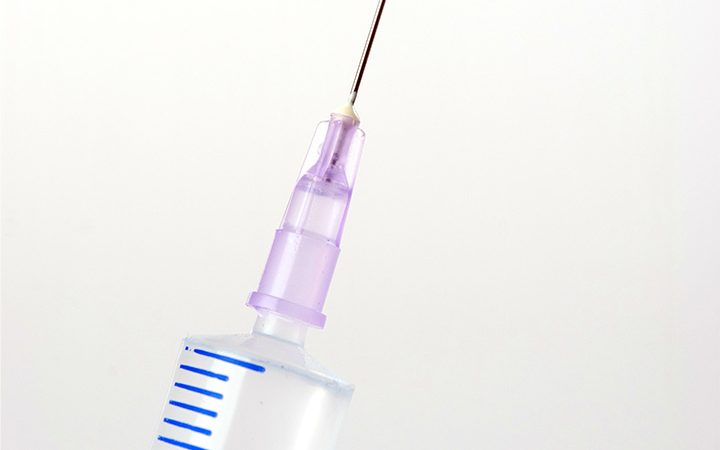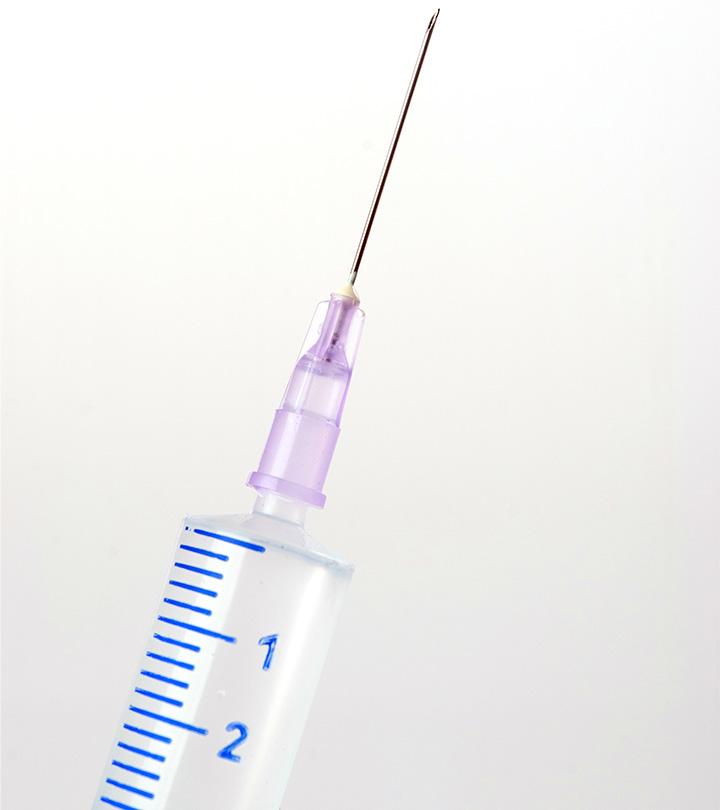Birth control shot is a hormonal method of female contraception and an effective way to prevent pregnancy. The shot is also known as contraception injection, birth control injection, or, based on brand names, Depo shot, DMPA, Sayana press, Noristerat, and Depo-Provera. This injection contains medroxyprogesterone acetate (DMPA), a synthetic progesterone hormone. Birth control shots are given on arms or buttocks every three months.
Read this post to know about the benefits, indications, side effects, effectiveness, and cost of birth control shots.
How The Birth Control Shot Works?
Progestin hormone in the birth control shot prevents ovulation and stops getting pregnant. When there is no ovum (egg) released to the fallopian tube, pregnancy cannot happen. In addition to suppressing ovulation, this hormone may thicken the cervical mucus and make it difficult for sperm to move. So the chance of being pregnant is further reduced (1).
What Are The Benefits Of Birth Control Shots?
Birth control shots are one of the most effective ways to prevent an undesired pregnancy. This is also used to treat or manage medical issues related to the menstrual cycle. Many women may choose birth control shot as a mode of contraception due to the following benefits (2) (3).
- No need to take an everyday pill or a weekly patch to prevent pregnancy
- Estrogen is not present in the shot
- No need to interrupt sex for contraception
- Reduces menstrual cramps and menstrual blood flow
- Lowers endometrial cancer risk
- Effectiveness is not affected by other medications
- Safe to use while breastfeeding
Birth control shots can also be given to cease or manage menstruations in the following conditions.
- Endometriosis
- Anemia
- Sickle cell disease
- Seizures
- Uterine fibroids
Although it is not a cure, birth control shots with progestin can reduce symptoms, such as pain and heavy bleeding, in endometriosis and uterine fibroids. Women with anemia can benefit from less bleeding or no bleeding since heavy menstruation may worsen their condition.
How Effective Are Birth Control Shots?
Contraception injections are more than 99% effective if used rightly (3). You may get a contraception shot every 12-13 weeks (every three months) to have effective contraception. It means you can prevent pregnancy by getting a contraception injection four times a year. Birth control injection can be taken anytime if there are no contraindications to use it.
Knowing the following factors may help to make the birth control shot more effective for you (1) (3).
- You may use birth control apps to remember the time for the next shot and appointments.
- Women who get an initial shot within the first seven days after the menstruation are protected from the pregnancy without additional contraception.
- Anyone getting the shot seven days after periods needs to use another method of contraception such as a condom or diaphragm for a week to prevent pregnancy.
- If you are two or more weeks late to get your next shot, use emergency contraception for unprotected vaginal intercourse to prevent pregnancy. You may use emergency contraception for up to five days.
- You can get a birth control shot immediately after miscarriage or abortion to prevent undesired pregnancies straight away.
- If a birth control shot is taken five days after miscarriage or abortion, you may need additional contraception (condoms) for the next seven days.
- Breastfeeding mothers may receive contraception injections after the initial six weeks of breastfeeding.
- You may get your next shot up to three weeks before the scheduled time if there is any inconvenience on the 13th week.
You may talk to your doctor if you have any concerns about the effectiveness of shots. Shots with additional barrier contraception, such as condoms, can protect from sexually transmitted diseases (STDs) and ensure more effective pregnancy prevention.
Who Cannot Use The Birth Control Shot?
Most women can use birth control shots safely. Contraceptive injections are not recommended for women with certain medical conditions (2).
- Liver diseases
- Lupus
- Vaginal bleeding of unknown cause
- Heart diseases
- Stroke
- Breast cancer
- Risk factors for osteoporosis
- Depression
- Allergic or sensitive to any components of the injection
It is recommended to seek consultation from a healthcare provider before using birth control shots. They can review complete medical history and suggest the best methods for you.
What Are The Side Effects Of Birth Control Shots?
Birth control shots can change the pattern of vaginal bleeding. Some women may experience irregular and frequent vaginal bleeding or menstruation. You may talk to the doctor to get medications to manage prolonged and frequent bleeding if it is not getting better with time. However, nearly 50 to 60% of women may not have to bleed (amenorrhea). Not having menstruation while taking birth control shots is not a cause for concern (4).
Other possible side effects of birth control shots may include (4):
- Skin changes
- Headaches
- Breast tenderness or soreness
- Mood swings
- Bone thinning
- Weight gain
A small reduction in bone density (thinner bones) is seen in some women. However, this can return to normal after ceasing the birth control injections. Approximately 20% of women experience weight gain after using birth control shots. Other disadvantages of birth control shots may include (2):
- Delay in return to fertility: If a woman using contraceptive shots desires to become pregnant, they may have to wait ten months or more to begin ovulation again. Contraceptive injections are not the right birth control method for women who want to become pregnant in the next year or near future.
- Do not protect from sexually transmitted infections (STIs): Hormonal contraceptives, such as contraceptive shots, cannot protect from STIs. You may use condoms to decrease the risk of STIs and seek medical advice if you have any concerns regarding HIV or any other sexually transmitted infections.
Although birth control shots have few side effects and disadvantages, there are no known serious health problems associated with them. Most of the side effects are known to settle over time after discontinuing the shots.
Where To Get Birth Control Shots?
Birth control shots are only available on prescription from a healthcare provider. You may get this from planned parenthood centers, health clinics, or hospitals. Doctors may look for contraindications, future pregnancy plans, and other medical issues before giving a prescription. Some of the shots, such as Depo-Provera, are given into the muscular tissue at the clinic by a doctor or nurse.
Subcutaneous contraceptive shots, such as Depo-subQ, Provera 104, and other brands, are available on prescription and can be self-administered at home. Healthcare providers may educate the women about the ways to administer subcutaneous contraception shots.
What Is The Cost Of Birth Control Shots?
Birth control shots can cost you up to $250 and consultation up to $150. However, the cost may vary depending on your insurance, place of residence, and available programs paying for shots in your area. Some women can get the initial consultation and the shot free of cost if they are eligible for certain programs or the insurance covers it (5).
Under the Affordable Care Act (Obamacare), most insurance plans cover doctor’s consultation charges for contraception in the US. You may find more about the insurance and plans covering contraceptives from your healthcare provider or planned parenthood centers.
Birth control shots are a highly effective mode of contraception. This can be more convenient for many women since there is no need to bother about daily pills or weekly patches. However, contraceptive injections do not protect against STDs. You may consult a healthcare provider for prescriptions since they can help you find the best contraceptive based on your requirements and health status.
References:
MomJunction’s articles are written after analyzing the research works of expert authors and institutions. Our references consist of resources established by authorities in their respective fields. You can learn more about the authenticity of the information we present in our editorial policy.



































